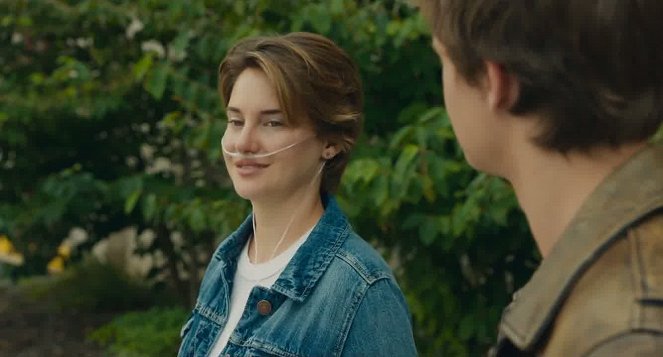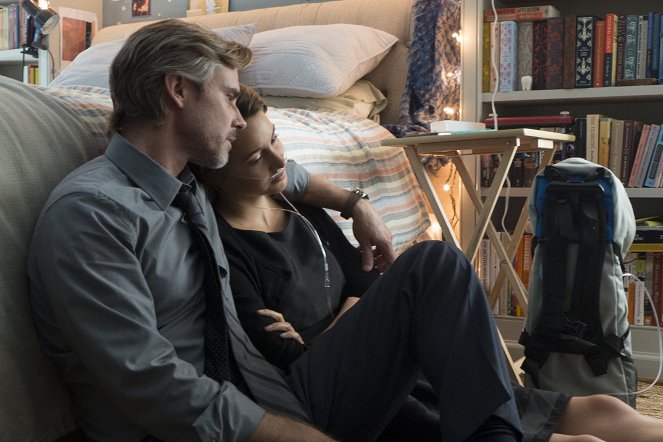Directed by:
Josh BooneCinematography:
Ben RichardsonCast:
Shailene Woodley, Ansel Elgort, Willem Dafoe, Laura Dern, Nat Wolff, Lotte Verbeek, Sam Trammell, Mike Birbiglia, Maurice Nathan Weert, Emily Peachey (more)VOD (4)
Plots(1)
Hazel and Gus are two teenagers who share an acerbic wit, a disdain for the conventional, and a love that sweeps them on a journey. Their relationship is all the more miraculous given that Hazel's other constant companion is an oxygen tank, Gus jokes about his prosthetic leg, and they met and fell in love at a cancer support group. (official distributor synopsis)
(more)Videos (18)
Reviews (11)
Okay, Hazel Grace? Moments of laughter, moments of tears – and the whole time with clenched fists, cheering for one miracle. The stars might not have been on Jim's side, but they were on ours. Because we could witness a captivating, intimate, and deeply personal love story. Personal not because Augustus has a Mass Effect poster at home or because he watches Buffy the Vampire Slayer with Hazel. Not even because I would definitely date a grenade of a girl. No, it's because until the very last breath, I admire how two people – despite illnesses, pain, and heart-wrenching disappointments looming every day – can give each other everything. And those who have loved before understand that a smile with tear-filled eyes is a constant state when it comes to these Stars.
()
A self-aware mix of romance and drama (a classic trend of recent years), with just the right amount of both. Too bad about the drawn-out ending, though, which may be too sentimental, but understandable considering the catharsis and the film's tone, but it never descends into awkwardness or pathos. The chemistry of the two leads is excellent, with a great Shailene Woodley, who will significantly overshadow Jennifer Lawrence in the future.
()
Simply beautiful film. I don't have much to criticize about it. Of course, some might find it self-indulgent. I see it as a beautiful celebration of love and life, portrayed brilliantly by the chosen actors. Humans are weak, but they can also be strong, and here we see it in all its aspects, just like the good and nasty people. The strongest part is definitely the events in Amsterdam.
()
For most of its run this film was surprisingly likeable because it wasn’t the self-serving and cheap emotional blackmail that I feared. And, even though in the end things eventually take the path of emotional blackmail, one it had skilfully crossed up that point, I still liked it. The strongest point is that both of the stars manage to play their roles in a very likeable way. I was actually looking forward to being sarcastically nasty at them, but I can’t.
()
In the context of the melodramatic “sick flick” subgenre, The Fault in Our Stars is satisfactory as only a film about dying teenagers can be. The creation of endings as one of the primary means of “making sense” of our existence is cleverly elevated to a leitmotif of the narrative, which from the opening words is presented as story about a story (or rather about making up stories). In Hazel’s case, the desire for a concluded narrative and control over her own story is strengthened by her illness. (In the director’s cut, Hazel’s transformation from the subject of the narrative to the subject conveying the narrative is more pronounced thanks to the scene in the ambulance, where she comes up with the continuation of the poem for Gus). The protagonist is motivated by a need similar to that which we as viewers satisfy by watching fictional stories. Due to the fact that our lives will end without us being able to add anything to them, fictional narratives serve as simulators that reconcile us with our own mortality. Melodrama most strikingly exploits the tension between fear of the end and the need to give that end a clearer form. The Fault in Our Stars is not satisfied with the helplessness of the essentially good characters (or those that are willing to change for the better) who are facing a terminal illness and attempts to reflect the aforementioned quality of melodrama on multiple levels. Though it’s true that the film bears all of the hallmarks of midcult filmmaking (parasiting on serious issues, audio-visual attractiveness, wrapping banal ideas up in dubious and important-sounding speeches, superficial characters), it achieves a more powerful emotional effect than many other, similar films thanks to its use of simple narrative devices. Credit is due mainly to the believable young actors and the screenplay, which is artful enough that you believe it rises above the clichés of Hollywood tearjerkers (though it does in fact jerk every last tear). Due to the ingenuity with which the film strives to convince us through flashes of black humour and the signs of unwillingness to play by the established genre rules that it is not just another run-of-the-mill melodrama, I gladly let myself be moved by The Fault in Our Stars. Maybe I’m becoming a softy. Or maybe I’m no longer such a cynic (and chauvinist) that I would reject a well-thought-out “chick flick” on principle. 65%
()



Ads